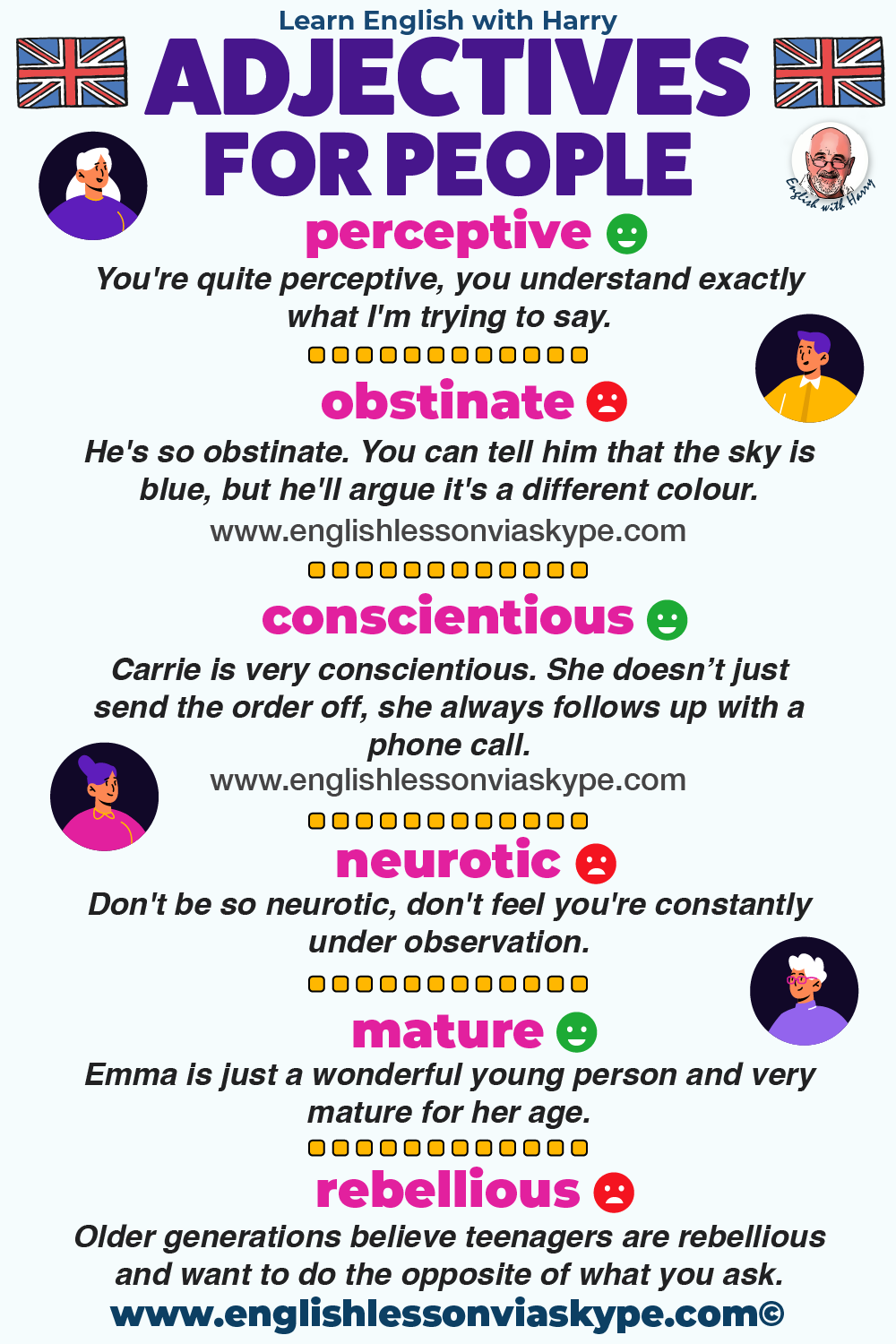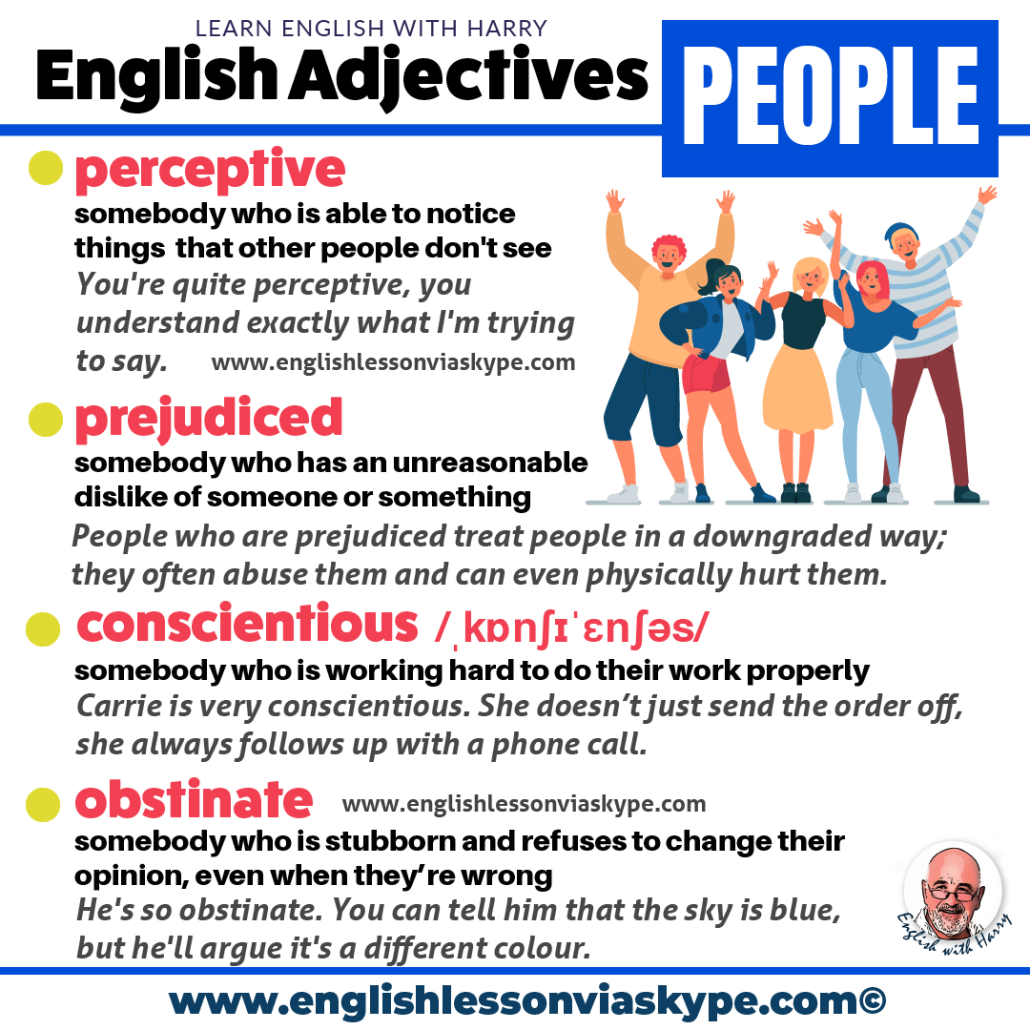Top advanced adjectives to describe a person in English.
This video is great for advanced English language learners who are learning vocabulary about describing people and want to improve their speaking skills.
This advanced English lesson is also important if you are preparing for English proficiency exams (IELTS, CAE, TOEFL) and want to impress the inspector with your vocabulary.
Listen to the podcast Speak Better English with Harry or watch it on YouTube at Learn English with Harry. englishclass101
List of adjectives for people
advanced adjectives to describe a person
Harry
Welcome back to advanced English lessons with Harry, where we try to help you to get a better understanding of the English language.
In this advanced English lesson, we’re looking at people.
And we’re going to look at adjectives that can describe people. There are quite a few of them.
I’ll go through them one by one, we’ve got 14 adjectives in total.
improve english on a budget
Online English Courses from €7.99
perceptive
Meaning: somebody who sees things that other people don’t see
Examples:
He’s very perceptive. He understands when there’s a problem. You don’t have to explain much to him.
You’re quite perceptive, you understand exactly what I’m trying to say.
inspirational
Meaning: somebody who encourages you to do great things
Examples:
My grandparents were inspirational role models whose love and encouragement allowed me to dream big.
John Alcock and Arthur Brown were my childhood heroes. I thought they were so inspirational when I was a kid.
overambitious
Meaning: having a stronger than normal wish to be successful, powerful, or rich
Example:
He’s not so much of a friend, you have to be really careful. He is overambitious and cares only about himself.
Top advanced adjectives to describe a person

conscientious
Meaning: somebody who is working hard to do their work properly
Example:
Carrie is very conscientious. She doesn’t just send the order off and hope that it arrives. She always follows up with a phone call.
obstinate /ˈɒb.stɪ.nət/
Meaning: you refuse to change your mind, even when you’re wrong
Example:
Ah, there’s no talking to him. He’s so obstinate. You can tell him that the sky is blue, but he’ll argue that it’s a different colour.
neurotic /njʊəˈrɒt.ɪk/
Meaning: always anxious about things that you consider unimportant
Example:
Don’t be so neurotic, don’t feel you’re constantly under observation. The fact is, you’re not; nobody really cares.
book your trial English Lesson
open-minded
Meaning: willing to listen to everybody’s opinions
Examples:
It’s great to have an open-minded boss. They can listen and are not afraid to change their mind.
If an employee has a different idea, the manager needs to be open-minded enough to consider that idea.
prejudiced
Meaning: you don’t consider other things so well, you have a closed mind
Example:
People who are prejudiced treat people in a downgraded way; they often abuse them and can even physically hurt them.
apathetic
Meaning: somebody who is full of apathy and doesn’t care
Example:
John is so apathetic. He never does any more than his nine-to-five job.
Useful advanced adjectives to describe a person

insensitive
Meaning: don’t take into account other people’s feelings
Example:
Peter was about to lose his job when everybody started talking about unemployment. That was a little bit insensitive.
solitary
Meaning: somebody who usually likes to be on their own
Example:
An introvert is someone who prefers to be solitary, rather than interact with large groups of people.
rebellious
Meaning: somebody who doesn’t like to live by the rules
Example:
Older generations believe teenagers are rebellious and want to do the opposite of what you ask.
mature
Meaning: behaving like a grown-up, more sensible in their actions and thoughts
Example:
Emma is just a wonderful young person and very mature for her age.
inquisitive /ɪnˈkwɪzɪtɪv/
Meaning: curious, constantly asking questions
Example:
Kids are inquisitive by nature. Young kids ask a lot of questions. They want to know everything about how the world works.
So there the 14 different adjectives that we can use to describe people.
Okay, so let me give them to you one more time.
- perceptive
- inspirational
- overambitious
- conscientious
- obstinate
- neurotic
- open-minded
- prejudiced
- apathetic
- insensitive
- solitary
- rebellious
- mature
- inquisitive
Okay, so as I said, and you know the drill by now, if you want to learn these, you have to practice them.
If you need any help, you contact me at englishlessonviaskype.com. I’ll give you some more examples.
As always, thanks for listening. Thanks for watching, Harry’s saying goodbye until next time, see you soon.
speak better English with Harry podcast- episode 400
more information
For more information on English grammar rules, English collocations and English idioms, check out the links below:
10 Different words for WALKING
English phrases with BLUE in them
You can always study English advanced level at Learning English with the BBC and British Council Learn English.
You will love these English lessons

Must-Have English Phrases For Online Meetings
Learn must-have English phrases for online meetings. I’m going to give you 36 specific key phrases that you can use


Describing People’s Appearance In English
Describing people’s appearance in English can be tricky for non-native English speakers. In this lesson, you will learn C1 Level


Advanced English Expressions With Down
Learn advanced English expressions with ‘down.’ Learn to use these expressions in a sentence and expand your English vocabulary. With

